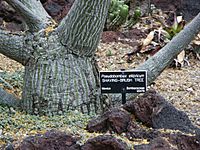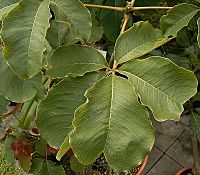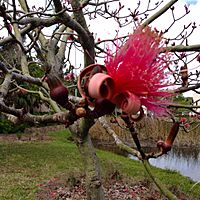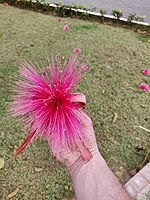Pseudobombax ellipticum facts for kids
Quick facts for kids Pseudobombax ellipticum |
|
|---|---|
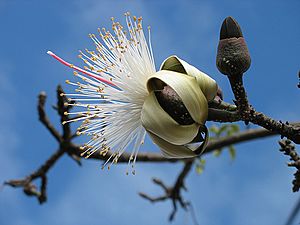 |
|
| Scientific classification |
|
| Kingdom: | Plantae |
| Clade: | Tracheophytes |
| Clade: | Angiosperms |
| Clade: | Eudicots |
| Clade: | Rosids |
| Order: | Malvales |
| Family: | Malvaceae |
| Genus: | Pseudobombax |
| Species: |
P. ellipticum
|
| Binomial name | |
| Pseudobombax ellipticum (Kunth) Dugand
|
|
| Script error: The function "autoWithCaption" does not exist. | |
Script error: No such module "Check for conflicting parameters".
Pseudobombax ellipticum, often called the shaving brush tree or Dr. Seuss tree, is a unique plant. It belongs to the Malvaceae family, which also includes cotton and hibiscus. This tree gets its fun name, "shaving brush tree," from its beautiful flowers that look like old-fashioned shaving brushes!
Contents
Where the Shaving Brush Tree Grows
This interesting tree is native to several warm places. You can find it growing naturally in southern Mexico, El Salvador, Guatemala, Honduras, Cuba, and the island of Hispaniola.
What the Shaving Brush Tree Looks Like
The shaving brush tree can grow quite tall, reaching up to 18 meters (about 60 feet). That's as tall as a six-story building! Its trunk can also be thick, about 1.3 meters (4 feet) across. The branches often grow close to the bottom of the main stem.
This tree is deciduous, which means it loses its leaves every year, usually in the dry season. It also has succulent stems, meaning they can store water. Each of its amazing flowers can produce hundreds of tiny black seeds. These seeds are very small, about 0.1 millimeters, and they usually sprout within 30 days. The flowers themselves smell nice and feel a bit sticky if you touch them.
How People Use the Shaving Brush Tree
People use the shaving brush tree for several things. Its wood is good for firewood and for carving small art pieces or handicrafts. The tree's beautiful, eye-catching flowers are also used to decorate homes and churches in Central America, especially for special events.
Growing the Shaving Brush Tree
Because of its unique look and pretty flowers, the shaving brush tree is also grown as an ornamental tree. This means people plant it just for its beauty in gardens and parks. You can find it growing in places like Florida, Hawaii, and along the coast of Southern California.
Gallery
- Pseudobombax ellipticum
See also
 In Spanish: Pseudobombax ellipticum para niños
In Spanish: Pseudobombax ellipticum para niños
 | Janet Taylor Pickett |
 | Synthia Saint James |
 | Howardena Pindell |
 | Faith Ringgold |


